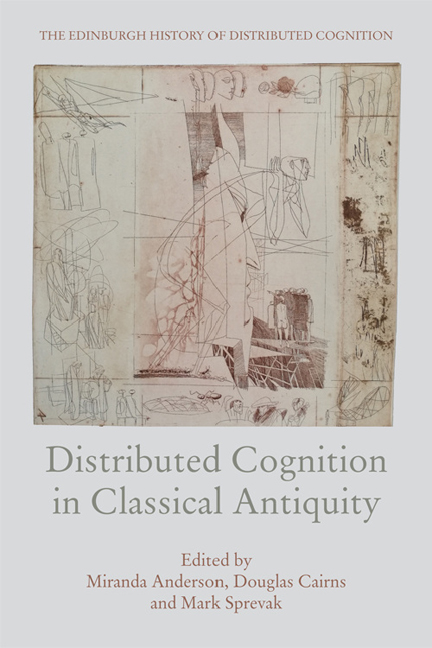Book contents
- Frontmatter
- Contents
- List of Illustrations
- Series Preface
- Miscellaneous Frontmatter
- 1 Distributed Cognition and the Humanities
- 2 Distributed Cognition and the Classics
- 3 Physical Sciences: Ptolemy's Extended Mind
- 4 Distributed Cognition and the Diffusion of Information Technologies in the Roman World
- 5 Mask as Mind Tool: A Methodology of Material Engagement
- 6 Embodied, Extended and Distributed Cognition in Roman Technical Practice
- 7 Roman-period Theatres as Distributed Cognitive Micro-ecologies
- 8 Cognition, Emotions and the Feeling Body in the Hippocratic Corpus
- 9 Enactivism and Embodied Cognition in Stoicism and Plato's Timaeus
- 10 Enargeia, Enactivism and the Ancient Readerly Imagination
- 11 Group Minds in Classical Athens? Chorus and Dēmos as Case Studies of Collective Cognition
- 12 One Soul in Two Bodies: Distributed Cognition and Ancient Greek Friendship
- 13 Distributed Cognition and its Discontents: A Dialogue across History and Artistic Genre
- Notes on Contributors
- Bibliography
- Index
2 - Distributed Cognition and the Classics
Published online by Cambridge University Press: 12 November 2019
- Frontmatter
- Contents
- List of Illustrations
- Series Preface
- Miscellaneous Frontmatter
- 1 Distributed Cognition and the Humanities
- 2 Distributed Cognition and the Classics
- 3 Physical Sciences: Ptolemy's Extended Mind
- 4 Distributed Cognition and the Diffusion of Information Technologies in the Roman World
- 5 Mask as Mind Tool: A Methodology of Material Engagement
- 6 Embodied, Extended and Distributed Cognition in Roman Technical Practice
- 7 Roman-period Theatres as Distributed Cognitive Micro-ecologies
- 8 Cognition, Emotions and the Feeling Body in the Hippocratic Corpus
- 9 Enactivism and Embodied Cognition in Stoicism and Plato's Timaeus
- 10 Enargeia, Enactivism and the Ancient Readerly Imagination
- 11 Group Minds in Classical Athens? Chorus and Dēmos as Case Studies of Collective Cognition
- 12 One Soul in Two Bodies: Distributed Cognition and Ancient Greek Friendship
- 13 Distributed Cognition and its Discontents: A Dialogue across History and Artistic Genre
- Notes on Contributors
- Bibliography
- Index
Summary
The purpose of this chapter is to provide a background to current research in Classics on topics related to distributed cognition and to consider how the various chapters in this volume represent, reflect and advance work in this area. This volume brings together eleven chapters by international specialists in the historical period from archaic Greece to late antiquity, with the majority of essays focusing on the period from the fifth century BCE to the third century CE. It includes essays on the ways in which cognition is explicitly or implicitly conceived of as distributed across brain, body and world in Greek and Roman technology, culture, science, medicine, philosophy, art, literature and drama. Together the chapters make evident the ways in which the particular range of sociocultural and technological contexts that existed in antiquity fostered and reflected particular notions of distributed cognition. In what follows I attempt to put these contributions in their wider research context, in terms of (a) mainstream classical scholarship, (b) earlier work in Classics which draws on the theories and findings of the cognitive sciences in general, and (c) existing applications of specific aspects of distributed cognition theory to classical material. In each of these sections I freely intersperse references to the chapters in this volume, where they can be seen as taking forward the issues in question or where they provide further information on topics canvassed here, before turning, in the concluding section, to the chapters themselves.
Distributed Cognition and Traditional Classical Scholarship
To a considerable extent, traditional ways of doing Classics, ancient history and classical archaeology either lend themselves to recasting in terms of distributed cognition or in fact already employ, usually without realising it, approaches and assumptions that can be expressed in those terms. For example, as contributors to this volume such as Christopher Gill and George Kazantzidis make clear, ancient philosophical theories of the nature of the psychē, its capacities, affections and afflictions, as well as its relation to the body, regularly rest on models that assume the interaction of body and soul in most if not all aspects of cognition and affectivity. The primacy of the body, as Kazantzidis demonstrates, is a given of Hippocratic medical theory. Aristotle's hylomorphic theory of the relation between body and psychē implicates the body in all or virtually all aspects of mental functioning.
- Type
- Chapter
- Information
- Distributed Cognition in Classical Antiquity , pp. 18 - 36Publisher: Edinburgh University PressPrint publication year: 2017



